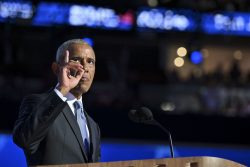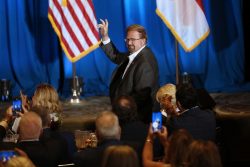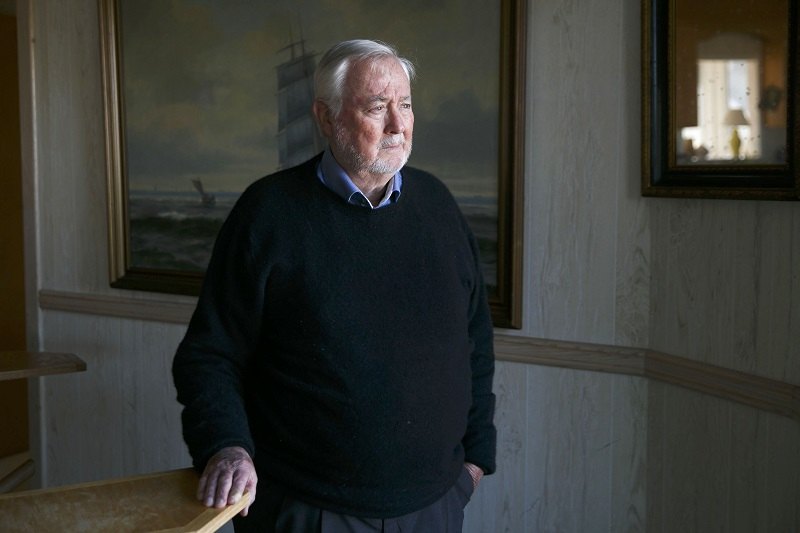
Spencer Oliver at his home on the Outer Banks of North Carolina. Oliver was the only Democratic National Committee official definitively identified as being successfully wiretapped in the Watergate scandal.
15:11 JST, June 17, 2022
One day in the spring of 1973, Spencer Oliver – a self-assured though little-known Democratic political insider with oversize wire-rimmed spectacles – says he got a call from his friend, Chuck Morgan, a prominent Washington attorney. “Come by for a drink this afternoon,” Morgan told him. “There’s someone I want you to meet.”
When Oliver arrived, he was ushered into Morgan’s Capitol Hill office. An unassuming, soft-spoken man with thick dark eyebrows, thinning hair and a creased, weatherworn face rose to greet him, Oliver recalled during a series of interviews.
“I’m Jim McCord,” the man said as he reached out to shake Oliver’s hand.
Oliver had no trouble recognizing McCord, who’d recently been convicted of conspiracy, burglary and wiretapping in a break-in the year before at Democratic National Committee headquarters at the Watergate. Before Oliver could introduce himself, McCord interjected.
“I know who you are,” McCord said. “And I know a lot about you.”
Oliver, the only DNC official definitively identified as being successfully wiretapped in the Watergate scandal, had just come face-to-face with the man who claimed to have put a bug on his phone in the first, mostly forgotten break-in at the DNC headquarters – weeks before the story erupted with the arrest of five burglars in a second break-in.
In his conversations with me, Oliver, now 84, offered the most comprehensive account to date of how he was thrust into a political scandal for the ages. For decades Oliver, who went on to a distinguished U.S. diplomatic career in Denmark, had mostly tried to avoid the topic of Watergate. Even though he was a victim, the stigma has followed him – long after the details have blurred with the passage of time. He’s haunted by the idea that he could be remembered solely as “the guy who was wiretapped in Watergate.”
As he has bored deeper into his memory of the events of half a century ago, Oliver has kept asking himself a question – the same question he’d asked McCord on that long-ago day: “Why me?”
– – –
Spencer Oliver loved the game. Politics was an exercise in moving pieces around boards. His network of contacts was vast. Even now, he has the aura of a Washington player. He is a tall man with a paunch – too many banquets during his diplomat days, he cracked one afternoon. He has a habit of expounding at great length in the manner of a person used to commanding a room. His voice carries a hint of a drawl, an echo of his Texas childhood.
One of our conversations – at a downtown Washington hotel cafe – was interrupted by a spiffily dressed man calling out, “Spencer!” It was Rufus Gifford, President Joe Biden’s chief of protocol, who’d gotten to know Oliver while stationed as President Barack Obama’s ambassador to Denmark at the same time Oliver was serving there as secretary general of the Organization for Security and Co-operation in Europe, a post he held for more than two decades until retiring from the 50-plus member-state group in 2015.
Another time – at a French bistro in D.C.’s Cleveland Park neighborhood, where he spent his high school years – J. Brian Atwood, who headed the U.S. Agency for International Development during the Clinton administration, came over to the table. “The last time we saw each other was in Ukraine,” Atwood said. (They were there on an election-monitoring mission.)
Dating back to his formative years in Washington in the 1960s and early 1970s, Oliver schmoozed with enthusiasm; fishing off the Dry Tortugas with party muckety-mucks or strategizing sotto voce with campaign insiders. “He knew everyone and he knew how to get results,” Severin Beliveau, Oliver’s longtime friend who served as Democratic state party chairman for Maine during the Watergate years, told me. “He got into the mechanics [of politics].”
Oliver was born into this world. His father, Robert Oliver, was a prominent union organizer and, after moving the family from Texas to Washington, a capital lobbyist with clientele that included the eccentric mogul Howard Hughes. (Oliver’s father sometimes shared clients with a Washington public relations firm, the Mullen Co., that served as a CIA front, according to a Watergate congressional report. Some Watergate theorists have sought to argue that the younger Oliver’s connection to Watergate has something to do with the CIA because the firm’s founder once asked him to join the company to be groomed as Robert Mullen’s successor – he refused – and because one of the DNC break-in planners, the former CIA agent E. Howard Hunt, worked at Mullen. Oliver has forcefully denied any CIA connection.)
While they were studying law in the 1960s, Oliver and Beliveau got cushy jobs with the Capitol police force. Watching American politics from ground-level perches, Oliver saw opportunity. He headed the Young Democrats, a moribund organization he’s often given credit for revitalizing. He built on that foundation by starting the Association of State Democratic Chairmen in 1971 and becoming its executive director.
After some turf squabbles, his association was absorbed into the Democratic National Committee in the early 1970s before Watergate. He was intimately familiar with the inner workings of the committee. In the late 1960s, he’d worked as the administrative assistant to the DNC chairman. One of his jobs was to find new office space for the DNC.
He settled on a spot along the Potomac River – a building called the Watergate.
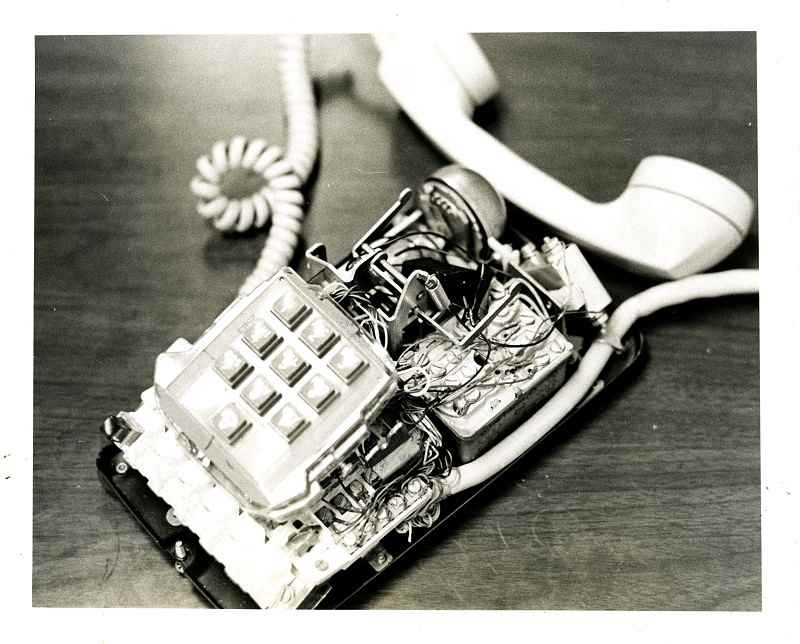
Spencer Oliver’s bugged telephone.
– – –
Sept. 7, 1972, dawned like just another day in the life of Spencer Oliver. He drove to the Watergate to deliver a report to the DNC’s executive committee.
A harried staffer twice interrupted him to deliver yellow message slips, saying he urgently needed to call Lawrence O’Brien, who’d recently left his job as DNC chairman to chair the presidential campaign of George McGovern, a U.S. senator from South Dakota. When Oliver called, Stanley Greigg, a former congressman from Iowa who’d joined the McGovern campaign, answered the phone.
Greigg had shocking news. Oliver had known that three months earlier, in June, there’d been a break-in at the DNC and that a team of five burglars with suspected Nixon campaign ties had been arrested. But Greigg told Oliver that O’Brien was about to hold a news conference to announce that an “unimpeachable authority” had confidentially revealed that there’d been a previous DNC incursion – in May that year – and that a nonfunctioning tap was placed on O’Brien’s phone and that Oliver’s phone was successfully tapped. “I was stunned,” Oliver told me.
Oliver, then 34 years old, pleaded with Greigg to persuade O’Brien not to reveal his name. He reasoned that in years to come no one would remember whether he was a bad guy or a victim. He’s kept an old political cartoon showing two men talking about another man walking past the Capitol: “I forget whether he’s the ‘tapper’ or the ‘tappee.’ ” On that day in 1972 Oliver was too late to preserve his anonymity. The media had already been tipped. Within hours, Oliver was whisked to the offices of attorneys O’Brien had enlisted to sue Nixon’s Committee to Re-elect the President, known by the nickname CREEP, which was suspected of involvement in the break-ins.
“Suddenly I became some kind of a freak,” Oliver said. Some of his DNC colleagues looked askance at him, Oliver told me, even wondering aloud why they weren’t tapped, as if it were an affirmation of a person’s importance. On Sept. 13 – less than a week after his life was thrown into turmoil – he was summoned to appear before a grand jury by Earl Silbert, an assistant U.S. attorney prosecuting the Watergate burglars.
After his short grand jury appearance, Oliver said, he called his secretary, who had contacted the phone company to inspect what she thought was a malfunctioning light on Oliver’s phone. The phone guy had found something, the secretary told him.
Moments after Oliver got back to the office, the FBI showed up. In the guts of Oliver’s phone lay a 1 1/2-inch wide, 1-inch long and 1-inch thick black box connected to three black wires, according to an FBI memo. The device was designed to emit a signal that would allow eavesdroppers to listen to calls remotely. Oliver told me he hadn’t had his phone checked before his secretary said something was amiss because he knew nothing about how wiretaps were done.
In the weeks to come Silbert sparred with the FBI over the discovery, asserting that the tap had been placed before the burglars were arrested in June and that the agency had “goofed” by missing it. The FBI pushed back, saying he was plain wrong. All the phones were taken apart and inspected after the June arrests, an FBI memo said, and no wiretap was found on Oliver’s phone. As for the tap found on Oliver’s phone in September, the FBI said it was inoperative and rudimentary; it was a different type than the taps carried by the burglars when they were arrested during the second break-in. In a memo, the FBI laboratory even theorized that the tap might have been placed by Democrats who wanted to “keep the pot boiling” by generating another headline-grabbing development that could be used against the Republicans.
What Oliver didn’t know was that the shocking news he’d received about his phone being bugged was not news to Silbert. Two months earlier – in July – Silbert and the FBI had interviewed Alfred Baldwin, a former FBI agent who confessed to spending three weeks at the Howard Johnson’s hotel across from the Watergate at the behest of McCord listening to calls placed on Oliver’s phone, according to a copy of Baldwin’s closed-door interview with prosecutors and the FBI. Baldwin told investigators that he wrote summary memos for McCord on stationery labeled “Gemstone,” the code name for the spying operation. (Those memos have never surfaced.)
Oliver has carried a grudge all these years that Silbert had kept him in the dark, fueling his impression that the U.S. attorney’s office was helping the Nixon White House. “Did they call the Democrats and say, ‘Oh, by the way, your phone was tapped,’ ” Oliver said. “What kind of assistant U.S. attorneys don’t tell somebody that they’ve been the victims of a crime? Why?” He didn’t hear from them until after the DNC announcement that September. And the burglars weren’t indicted until two days after the tap on his phone was discovered.
Silbert, now 86 and at work on a memoir of his Watergate years, denies any foot-dragging. He told me that he was employing a common investigative technique by keeping Baldwin’s revelation secret and delaying an indictment because he was using that information to build a case against the Nixon allies who oversaw the burglars – Hunt and G. Gordon Liddy – and didn’t want to tip his hand.
As time has passed, Oliver has developed his own theory, asserting in a text message to me that Silbert “didn’t do anything or say anything BECAUSE HE WAS ALREADY PART OF THE COVERUP.” Oliver also points out that less than two years after the break-in Silbert was nominated by Nixon to be U.S. attorney in the District of Columbia.
In the years after the Watergate break-ins, Morgan, Oliver’s friend and attorney, who’d introduced him to McCord, publicly accused Silbert of vigorously pursuing a dubious theory that the wiretapping was intended to blackmail Oliver. (Morgan headed the American Civil Liberties Union office in Washington and had become acquainted with McCord through friends in the legal community.) Silbert said to me that he considered the possibility that blackmail was a motive for the wiretapping because Baldwin said he’d been explicitly instructed by his boss McCord to monitor “personal” and business calls.
Morgan also criticized Silbert for limiting the indictment to Liddy, Hunt and the burglars. He interpreted that decision as an effort to shield higher-ups in the Nixon administration. Silbert countered that he was intent on seeking an indictment focused on the burglars and their handlers that could be readily understood by a jury and result in a conviction that would put pressure on other conspirators.
Nixon’s nomination of Silbert foundered, but he would eventually be overwhelmingly confirmed in a bipartisan Senate vote after being nominated by the man who pardoned Nixon: the disgraced president’s successor, Gerald Ford.
Fifty years later Oliver is still fuming: “They missed the whole thing. All they caught were the burglars, but they never figured out why they were in there and what they were looking for, what they got and how they used it.”
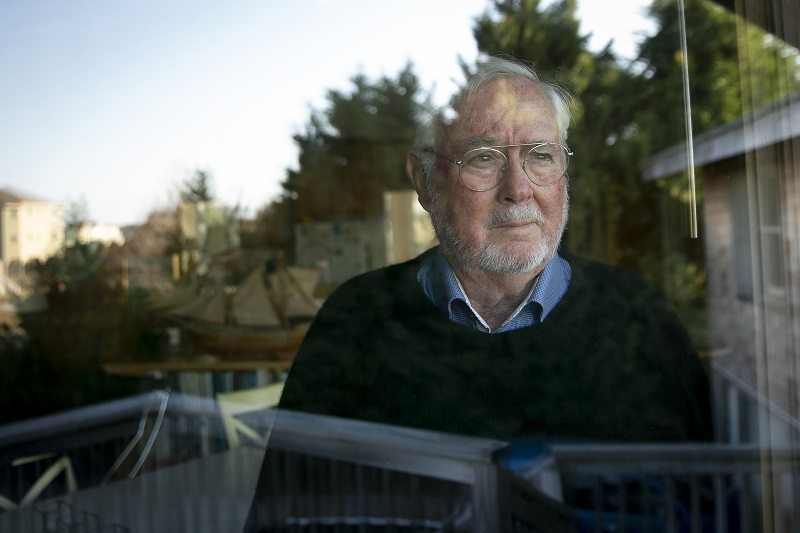
Spencer Oliver, who went on to a U.S. diplomatic career in Denmark, blames Watergate for derailing his career in party politics.
– – –
After O’Brien’s revelation of the wiretapping in 1972, a lawsuit filed on behalf of O’Brien, the DNC and Oliver was trudging along. O’Brien and the DNC settled. But Oliver refused. He told me he suspected a conspiracy that went far beyond the tapping of his phone and the botched attempt to surveil O’Brien. Oliver believed fresh details might be revealed in discovery and depositions for the case.
A new DNC chairman, Robert Strauss, clashed publicly and privately with Oliver, urging him to drop the lawsuit, arguing the party needed to move beyond Watergate. Strauss was the protege and close confidant of former Texas governor John Connally, who served as Nixon’s treasury secretary. Connally was considered by Nixon insiders as a running mate and headed a Democrats for Nixon campaign in the 1972 election. Oliver has developed a complex and speculative theory that Strauss wanted the lawsuit scuttled because discovery associated with the case would reveal Connally and Strauss collaborating to help McGovern – the candidate Nixon thought would be easiest to beat – win the Democratic nomination.
Oliver blames Watergate for derailing his career in party politics, which he once thought would lead to the chairmanship of the DNC, and for dealing a final, fatal blow to his already troubled marriage. He believes attempts were made to put financial pressure on him so he’d drop his lawsuit. He split his time in those days between two jobs. Strauss eventually forced him out of the DNC, and Oliver barely held off an attempt by Republicans to oust him from the presidency of the American Council of Young Political Leaders, a bipartisan group that arranged exchanges between rising U.S. government officials and their counterparts in other nations.
Oliver wasn’t the only one trying to suss out the wiretappers’ motives. Silbert, the Watergate prosecutor, told me recently that he concluded the tap was placed by mistake on Oliver’s phone. After all, Silbert said, Baldwin – the man eavesdropping on the calls – had said he didn’t know at first whether he was listening to someone whose first name was Spencer or whose first name was Oliver.
Washington was awash in rumors that much of the conversations dealt with sex. Maybe it would be less of a mystery if Baldwin had been able to say more. Federal law prohibited him from disclosing the contents of wiretapped conversations. Baldwin’s closed-door interview with prosecutors and the FBI became a public record many years later, revealing that he told investigators about hearing Oliver discuss political matters, including backing one of McGovern’s more politically moderate competitors for the Democratic presidential nomination during the state convention in Texas that took place while he was being wiretapped. He makes no mention of hearing any racy talk. Yet John Ehrlichman – the Nixon counsel who was imprisoned for his role in the coverup – can be heard on the White House tapes saying the DNC spying operation was primarily collecting information about “this fellow Oliver phoning his girlfriends all over the country lining up assignations.”
Far from gallivanting around the country having affairs, Oliver told me he was actually talking on his office phone frequently about going through intense couples counseling. He was attempting to save his marriage and preserve his home life with three children, then ages 9, 12 and 14.
Several months after the break-ins, his secretary Ida “Maxie” Wells, who had quit when the Watergate story broke, came to his office with another secretary, Oliver said. They wanted him to know they often used his phone when he was out of town to talk about their dates, Oliver told me. “You just don’t know how women talk,” they said to him. “You think boys’ locker room talk is bad. You ought to hear women talk about their sexual interests.” Wells, now a retired college English instructor in Louisiana, told me that she didn’t remember the precise words she’d used, but that it sounded like something she’d say. (Wells has also vehemently denied speculative theories that there was a call-girl ring being run out of the DNC offices and that she was involved in running it.)
A few years ago, Oliver was browsing a bookseller’s table in a Copenhagen park when he stumbled upon a 10-cent copy of the diaries of H.R. Haldeman, the Nixon White House chief of staff who was imprisoned for his role in the Watergate coverup. Oliver bought the book and then started accumulating other Watergate works. Leafing through them brought back memories he was still reluctant to revisit. When I called him earlier this year as the 50th anniversary of the second Watergate break-in approached, Oliver said he felt newly inspired to understand the mess he lived through. Soon he was sifting through boxes of material stashed at the Washington apartment he uses occasionally between longer stays at his seaside home in Denmark and his secluded getaway on the Outer Banks of North Carolina. He reviewed hundreds of pages of transcripts, court records and letters, scrawling notes in the margins; and he learned facts about the case through public records I showed him that he’d never seen before.
As more clues are unearthed over the years, Oliver’s Watergate cameo becomes ever more convoluted and mysterious as researchers and conspiracy theorists connect various dots. Was he a key to understanding Watergate, right at the “heart of the scandal,” as posited to me by James Rosen, a biographer of Nixon’s attorney general, John Mitchell, who has challenged received wisdom about the break-ins? Or was he a “curiosity” and “an asterisk” in the larger panorama of widespread political espionage and coverup, as described to me by Carl Bernstein, the Washington Post reporter who teamed with his colleague, Bob Woodward, to break the stories that made Watergate a national obsession? “Nobody knows for sure,” Bernstein says.
All Oliver can do is rely on that long-ago conversation with the spymaster McCord and the crusading lawyer Morgan. McCord is dead. Morgan is dead. What lives is Oliver’s memory of what he says McCord told him: “We knew who you were. We knew what you did. We thought we’d get a lot of political information.”
It sounds simple and straightforward enough. But in Watergate, nothing is simple and straightforward.
Top Articles in News Services
-

Prudential Life Expected to Face Inspection over Fraud
-

Hong Kong Ex-Publisher Jimmy Lai’s Sentence Raises International Outcry as China Defends It
-

Japan’s Nikkei Stock Average Touches 58,000 as Yen, Jgbs Rally on Election Fallout (UPDATE 1)
-

Trump Names Former Federal Reserve Governor Warsh as the Next Fed Chair, Replacing Powell
-

Suzuki Overtakes Nissan as Japan’s Third‑Largest Automaker in 2025
JN ACCESS RANKING
-

Japan Institute to Use Domestic Commercial Optical Lattice Clock to Set Japan Standard Time
-

Israeli Ambassador to Japan Speaks about Japan’s Role in the Reconstruction of Gaza
-

Man Infected with Measles May Have Come in Contact with Many People in Tokyo, Went to Store, Restaurant Around When Symptoms Emerged
-

Prudential Life Insurance Plans to Fully Compensate for Damages Caused by Fraudulent Actions Without Waiting for Third-Party Committee Review
-

Woman with Measles Visited Hospital in Tokyo Multiple Times Before Being Diagnosed with Disease




